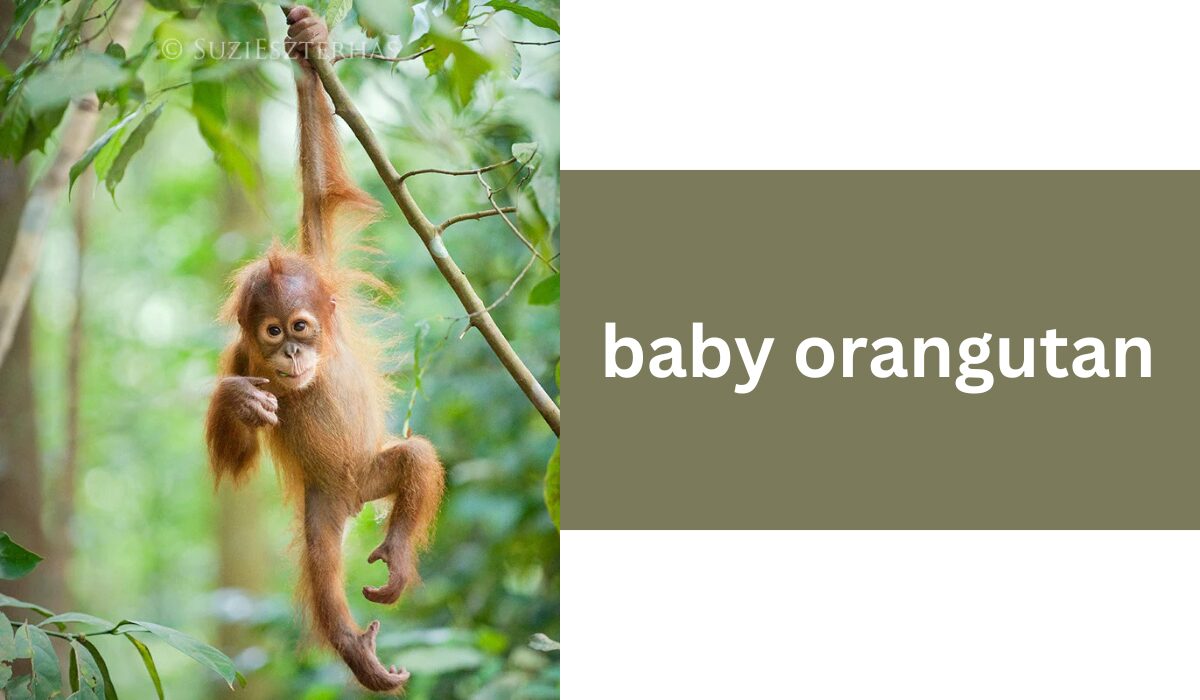In the lush green canopies of Southeast Asia, baby orangutans swing from branch to branch, embodying the very essence of curiosity and innocence. These gentle creatures not only captivate our hearts with their soulful eyes and playful nature but also play a pivotal role in maintaining the ecological balance of their habitat. Orangutans are often referred to as “gardeners of the forest” because of their role in seed dispersal, which is crucial for the health of their ecosystem. For conservation enthusiasts, parents, and animal lovers alike, understanding the life and challenges faced by baby orangutans is not just an exploration into the wild but a call to action to ensure that these magnificent beings continue to thrive for generations to come.
The Life of a Baby Orangutan
A baby orangutan’s life begins in the dense rainforests of Borneo and Sumatra, where it clings to its mother, relying on her for warmth, nourishment, and protection. During the first few years, the bond between a mother orangutan and her baby is incredibly strong. Baby orangutans are nurtured and taught essential survival skills, such as climbing and foraging for food. These formative years are marked by learning through imitation, where the young ones mimic their mothers’ actions, gradually attaining independence.
During this period, baby orangutans exhibit unique behaviors and reach several milestones. From the age of six months, they start exploring their surroundings while still under the watchful eye of their mothers. By the time they are around two years old, they begin to try solid foods and learn to identify safe and nutritious fruits. Despite their growing independence, they remain close to their mothers until they are about six to eight years old, a testament to the long and crucial developmental period orangutans undergo.
Baby orangutans are known for their playful nature, often seen tumbling and playing with their peers. This play not only fosters social skills but also builds the physical strength needed to traverse the vast rainforest canopies. Through these interactions, they develop a sense of community, an essential survival skill for adult life in the wild.
Threats to Orangutans
Despite their serene existence, orangutans face significant threats that endanger their very survival. Habitat loss is the most pressing issue, as vast tracts of rainforest are cleared for palm oil plantations and logging. This destruction leaves orangutans, especially the young, vulnerable and displaced. Without their natural habitat, baby orangutans lose their source of food and shelter, making them susceptible to starvation and predation.
Another grave threat is the illegal pet trade, which exploits the allure of baby orangutans. Poachers target these infants after killing their mothers, selling them to be kept as exotic pets. The traumatic separation from their mothers and harsh conditions they endure during capture and transport result in high mortality rates. For those who survive, captivity can lead to physical and psychological damage, depriving them of the chance to live a natural life.
These threats are compounded by the fact that orangutans reproduce slowly, with females giving birth only once every six to eight years. This slow reproductive rate makes population recovery difficult, exacerbating the impact of human activities on orangutan populations.
Conservation Efforts
Amidst these challenges, numerous conservation projects are working tirelessly to protect and rehabilitate orangutans. Organizations like the Orangutan Foundation International and the Borneo Orangutan Survival Foundation focus on rescuing orphaned and injured orangutans. They provide sanctuary and rehabilitation, preparing these young orangutans for reintroduction into the wild.
These projects often involve local communities, offering education and alternative livelihoods to reduce reliance on destructive practices. By involving the people who share the orangutans’ habitat, these initiatives foster a sense of stewardship and empower communities to take an active role in conservation efforts.
Research and advocacy play a critical role in these conservation strategies. Scientists study orangutan behavior and ecology to develop effective management plans, while advocacy groups raise awareness about the plight of orangutans, lobbying for stronger environmental protections.
How You Can Help
Conservation is not solely the responsibility of organizations; individuals can make a significant impact too. Simple actions, such as supporting brands that use sustainable palm oil, can reduce the demand driving deforestation. Educating oneself and others about the importance of orangutans and their habitat is a powerful way to amplify the message of conservation.
Consider donating to or volunteering with reputable organizations dedicated to orangutan conservation. Your contributions can fund the rescue and rehabilitation of baby orangutans, support reforestation projects, and promote sustainable development in local communities.
By visiting certified wildlife-friendly tourist sites, you can contribute to conservation through eco-tourism. These sites offer a glimpse into the incredible world of orangutans while ensuring that your visit supports their protection and the welfare of local communities.
You May Also Like:
Unveiling the Mysteries of Leomorg: A Comprehensive Blog Article
Conclusion
The story of baby orangutans is a compelling narrative of innocence, resilience, and the urgent need for conservation. These gentle creatures, with their unique charm and ecological significance, deserve our protection and advocacy. By understanding the threats they face and the efforts underway to save them, we can all contribute to a future where orangutans continue to thrive in their natural habitats.
By sharing their story and spreading awareness, we can inspire others to join the cause, creating a global community committed to wildlife conservation. Together, our collective efforts can ensure that the enchanting presence of baby orangutans continues to grace the rainforests of Southeast Asia for generations to come. Join us in this vital mission and make a difference today.





